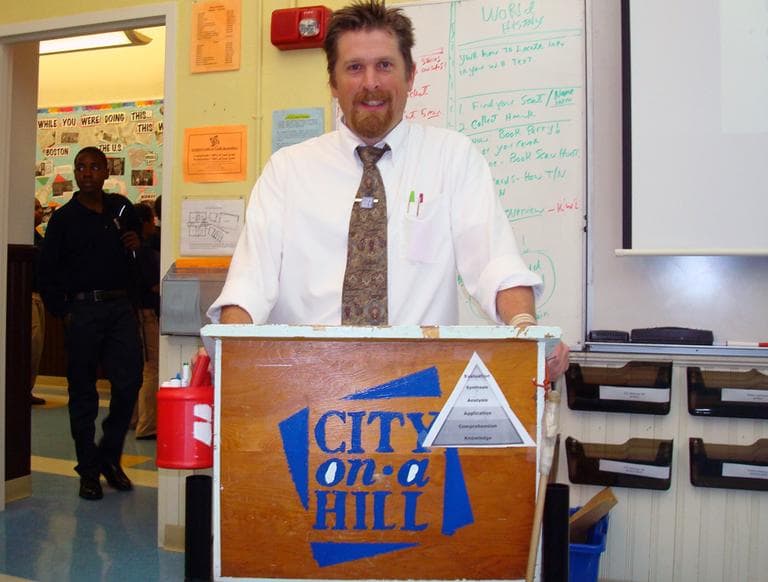Advertisement
Boston High School Kids Learn About 9/11 — For The First Time

Students at City on a Hill Charter School in Roxbury learned about 9/11 this week. For some, it was their first time.
Their teacher, Patrick Foley, has been dealing with 9/11 in his classroom since the day it happened.
"I was teaching in East Boston at a small private school that overlooked the airport," Foley said. "We turned on the TVs and one of my students said, 'Mr. Foley, my mother flew out of Logan this morning.' She literally watched her mother crash into a building in New York, in my class."
In the years since, Foley has developed a number of ways of integrating the attacks into his curriculum. But this year, he has had to go back to the drawing board.
"It has changed because our students no longer have that mantra of 'Never Forget,' because they don't remember. They're too young now," he said.
When Foley asked his class if they remembered 9/11, just a few kids meekly lifted their arms. It's no surprise, Foley says, considering this year's 10th graders were 5 or 6 years old back then.
"So my class now is going from kind of a therapeutic, 'Where were you?' What do you remember?' to now, 'What happened?'"
Foley says his students are learning history from YouTube, where they're getting more conspiracy theories than basic facts.
"I think I might have heard something, like, George Bush had something to do with it," said Chloi, a student in Foley's class.

Another kid in the back said she heard Saddam Hussein had something to do with it — a misconception once held by 70 percent of Americans.
"As a history teacher, I try to first have my students connect to the images, the sound, the smell of what's happening in that time period, and then deal with the facts," Foley said.
So, Foley queued up the made-for-TV-movie about United Flight 93, the plane that crashed in Pennsylvania after passengers staged a revolt.
After the lights came up, Foley guided his students through a series of questions designed to put them in the shoes of the people who lived and died that day.
He asked the class if they would have joined in rushing the cockpit.
"I said 'No,' because like, the people that took over the plane, was like al-Qaida and something, right?" said a student named Asante. "What if they had weapons or guns or whatever?"
The class debated what they would have done.
"I think I would because we're most likely dying anyway," Chloi said. "Personally, I'd rather get shot dead because it's just immediate, rather than be suffering hitting a building."
Foley and the class dove pretty far into the emotions of people on the United 93.
"Here's the hard one folks," Foley told the class. "If you were on that plane, who would, who would you call?"
"Our students no longer have that mantra of ‘Never Forget,’ because they don’t remember. They’re too young now."
Patrick Foley, teacher
Students paused to think.
"For me, I wouldn't call anyone, because if I called my parents and I don't call the other people — like say if I was married, my husband — I wouldn't want to pick people over people, like the people I love."
Not all teachers incorporate 9/11 into their curricula. Some might say that the material is too delicate for a classroom. But Alexis, one of Foley's students, says 9/11 is part of history, even if it's recent history.
"They should watch it because it's a part of American history, and the same way we can learn about slavery and other powerful things that happened in history, you should be able to learn about this, too," Alexis said.
Now that he's gotten his students emotionally invested in the story of 9/11, Foley hopes they'll be more interested to hear about the facts in subsequent lessons. But when it comes to teaching about terrorism, even the facts are fraught.
"When Osama bin Laden released his tapes, his motivation, as he claims, was three reasons: American troops in Saudi Arabia, American involvement in Israel, and sanctions in Iraq," Foley said. "A lot of our students aren't going to know what any of those three mean and that's my job as a history teacher."
This segment aired on September 9, 2011. The audio for this segment is not available.